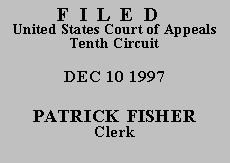

|
GILBERT H. CONNALLY,
v.
BOBBY BOONE |
|
Before SEYMOUR, Chief Judge, PORFILIO and MURPHY, Circuit Judges.
Petitioner Gilbert H. Connally, appearing pro se, petitioned the district court for a writ of habeas corpus pursuant to 28 U.S.C. § 2254. The district court denied the petition. We DENY Connally a certificate of probable cause and DISMISS this appeal.(1)
Connally was convicted by an Oklahoma jury of distribution of a controlled dangerous substance and was sentenced to a sixty-year prison term. His conviction was upheld on direct appeal and several subsequent state postconviction proceedings failed to provide Connally relief from the conviction or sentence. Connally then filed the instant petition pursuant to § 2254 alleging seventeen claims of error. After the claims were referred to a magistrate judge for initial proceedings, the magistrate recommended that Connally's petition be denied. Connally thereafter filed written objections which presented the following two issues for the district court's review: (1) whether his Sixth Amendment rights were violated through an invalid waiver of counsel; and (2) whether he had sufficiently established his actual innocence to overcome the procedural bar to the review of his other claims of error. In response to Connally's limited objections, the district court correctly noted that Connally had waived review of the magistrate's recommendations as to issues not identified in the objections. See Moore v. United States, 950 F.2d 656, 659 (10th Cir. 1991). As to the specific objections raised by Connally, the district court concluded the record established a knowing, voluntary, and intelligent waiver of his right to counsel and that Connally had failed to make a sufficient showing of actual innocence to overcome the procedural bar.
This court has conducted a de novo review of Connally's brief and application for a certificate of probable cause, the magistrate's Report and Recommendation and district court's Order, and the entire record on appeal. In light of that review, we conclude that Connally has failed to make a "substantial showing of the denial of a constitutional right" for substantially the reasons set for in the district court's order dated June 6, 1997. See Barefoot v. Estelle, 463 U.S. 880 & n.4 (1983) (holding that a certificate of probable cause should only issue where petitioner has demonstrated the issues raised are (1) debatable among jurists of reason, (2) a court could resolve the issues differently, or (3) the questions presented are deserving of further proceedings."). Accordingly, this court DENIES Connally a certificate of probable cause and DISMISSES the appeal. Connally's "Motion to Produce Exculpatory Evidence" is DENIED.
ENTERED FOR THE COURT
Michael R. Murphy
Circuit Judge
*. This order and judgment is not binding precedent, except under the doctrines of law of the case, res judicata and collateral estoppel. The court generally disfavors the citation of orders and judgments; nevertheless, an order and judgment may be cited under the terms and conditions of 10th Cir. R. 36.3.
1.Because Connally filed his habeas petition in 1995, before the enactment of the Antiterrorism and Effective Death Penalty Act of 1996 ("AEDPA"), Pub. L. No. 104-132, 110 State. 1214, the AEDPA's certificate of appealability requirements do not apply to this appeal. See United States v. Kunzman, 125 F.3d 1363, 1364 n.2 (10th Cir. 1997). Instead, the pre-AEDPA certificate of probable cause requirements apply here. Nevertheless, despite the label this court attaches to the requirements, Connally's substantive burden is the same. See Lennox v. Evans, 87 F.3d 431, 434 (10th Cir. 1996), cert. denied, 117 S. Ct. 746 (1997), overruled in part by Kunzman, 125 F.3d at 1364 n.2. Accordingly, this court will liberally construe Connally's application for a certificate of appealability as an application for a certificate of probable cause.